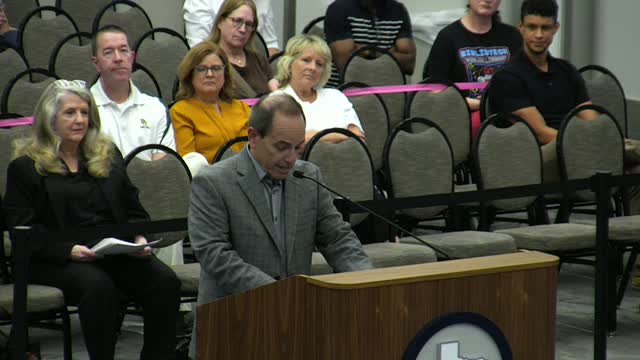Parents urge pause as McKinney ISD facilities committee studies repurposing of three elementary schools
Get AI-powered insights, summaries, and transcripts
Subscribe
Summary
Community members, especially parents near Edens Elementary, pressed the McKinney ISD Board of Trustees to slow the Educational Facilities Alignment Committee (EFAC) process and increase public outreach as the committee evaluates repurposing three elementary campuses in the district's southwest quadrant.
The McKinney Independent School District Board of Trustees heard more than a dozen public comments Monday night urging the district to extend community engagement and slow a process that could repurpose three elementary campuses in the southwest part of the district.
The comments came during public comment and a staff presentation about the Educational Facilities Alignment Committee, a 44-member group convened to review a long-range planning recommendation to repurpose three elementary schools because that area’s enrollment and utilization have declined to about 75% of capacity.
District consultant Trey Laird of VLK outlined the committee’s process and schedule: seven small “table” groups working by consensus, two public feedback sessions (one scheduled for Oct. 21 and a second for Dec. 2), and a committee recommendation planned for the board on Dec. 15. Laird said the committee is using five primary evaluation indicators identified by the members: building design capacity, demographic trends, financial efficiency, building age and condition, and geographic location and potential redundancy.
Parents and community members focused their remarks on the potential closure or repurposing of Edens Elementary, a neighborhood school they described as a walkable community hub. Several speakers said the committee’s timeline and meeting formats felt rushed and that selected options presented to stakeholders appeared limited.
Carly Vasquez identified herself as a parent and real estate professional and said she understood the state funding pressures that prompted district planning but asked for more community engagement and clear timelines. “Neighborhood elementary schools are more than instruction sites. They are hubs for parent involvement and local volunteer community activities,” Vasquez said.
Hagen Vosick, who said he is a parent of Edens students, emphasized proximity-to-home, a priority cited in the district’s Long Range Facility Plan. “Edens is uniquely located in the heart of our neighborhood,” Vosick said, adding that roughly 60% of students there continue to walk or bike to school and that the walkable routes support independence and social development.
Other speakers who identified themselves as Edens parents or nearby residents raised similar concerns: potential impacts on home values, increased traffic and truck deliveries if a campus were converted to a non-school use, and the social and developmental benefits of walking or biking to a neighborhood school. Sharon Havard, who identified herself as a former principal at Edens, urged the board to consider the potential effects on vulnerable students and campus culture.
Trustees acknowledged the emotion in public comments and said they were listening. Board members and Superintendent Pratt repeatedly described the process as difficult and acknowledged the committee’s charge is to find options where there is no perfect answer. Trustees asked staff to ensure the committee’s work and the upcoming community feedback sessions were widely publicized and accessible, and tentatively set an additional board check-in meeting for Nov. 5 at 6 p.m. to receive a status update from the committee. Trustees said Nov. 5 would be a chance to see whether the committee is prepared to advance a first-level recommendation before the decison-focused meetings in December.
Laird and district staff said the committee had already reviewed demographic and capacity data for the southwest zone, maps of one-mile and one-hour walk/radius areas, and financial efficiency metrics. Laird reiterated that EFAC’s recommendation would consider facility capacity, enrollment trends, building condition and redundancy to propose options that the board could then take to rezoning and implementation steps.
The board did not take a formal vote on repurposing at the Oct. 20 meeting. Trustees asked for documentation of committee criteria, the full list of options considered, and summaries of the community feedback gathered at the upcoming sessions; staff agreed to supply that material ahead of future board meetings.
Community members and the district will have two formal opportunities this fall and early winter to offer input before the committee is scheduled to forward recommendations to the board on Dec. 15.
